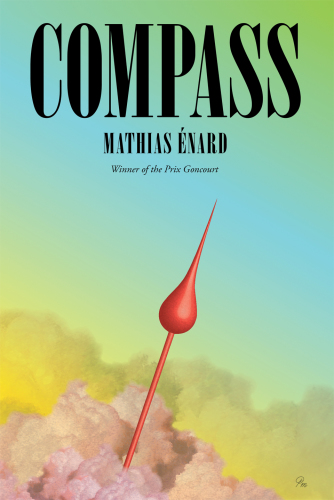
Compass
کتاب های مرتبط
- اطلاعات
- نقد و بررسی
- دیدگاه کاربران
نقد و بررسی

January 9, 2017
This astonishing, encyclopedic, and otherwise outré meditation by Énard (Zone) on the cultural intersection of East and West takes the form of an insomniac’s obsessive imaginings—dreams, memories, and desires—which come to embody the content of a life, or perhaps several. Franz Ritter is a musicologist who, though steeped in European culture, has yearned throughout his life for the the East; its poets, cities, and sensibility. In this opium addict’s dream of a novel, we retrace Ritter’s adventures in Palmyra, where he sleeps among the Bedouin; in Istanbul, on nights spent in the company of a debauched Prussian archeologist; and in Damascus, among the ruins where Ritter searches out “the reverie and sensual sweetness of the Arabian Nights.” The erudite Ritter also recalls episodes from the lives of historical personages such as Franz Liszt, Fernando Pessoa, and the Persian writer Sadegh Hedayat, the last of whom happens to have been the subject of a dissertation by Ritter’s unrequited love object, the equally cultured Sarah. It is to thoughts of Sarah, with whom Ritter parted in Damascus, that Ritter returns most frequently, hoping to reunite with her even as actual events in the Islamic world intrude on Ritter’s fantasies of Ottomans and sultans. Though occasionally exhausting, Compass is a document of the West’s ongoing fascination with all things Oriental, richly detailed, and a cerebral triumph of learning, as well as translation. For readers who ask literature to do what history and politics cannot, unraveling
nard’s arabesque yields a bounty.

Starred review from February 1, 2017
The winner of France's 2015 Prix Goncourt: a fever-dream meditation on East and West and on a lost love that binds the two worlds.Franz Ritter is an old-fashioned European neurasthenic, his lassitude helped along by artificial means: Enard's opening words, after all, are, "We are two opium smokers each in his own cloud." Indeed, and that "we" might just as well be the civilizations of Europe and the Muslim world, joined, Franz's beloved Sarah observes, by the Danube, "the river that links Catholicism, Orthodoxy, and Islam." Don't forget Judaism, counsels Franz meaningfully. It is about the only time when Sarah, a brilliant scholar, comes up short, but meanwhile Franz has fallen ill, perhaps for one last time, wishing he had--well, among other things, a little more opium, which is not so easy to come by in the Vienna of today, at least not for a law-abiding fellow. And so he lies awake, and he ponders, and he remembers: nights in Beirut and Aleppo before the destruction, days spent among the modern ruins of the Middle East, contemplating the "mosque of the Omayyads without its minaret, its stones lying scattered in the courtyard with the broken marble." Some of Enard's novel, drawing on his own career as an Arabist and translator, speaks to might-have-been possibilities: what might happen if the two worlds got along for once? There are quiet sendups of academia, of orientalist nostalgia along the way, but mostly this is a calmly paced tour of a long history, one in which Napoleon and Hitler, Wahhabism and Wagner alike bow in and out. There are moments of quiet Arabian Nights eroticism, too: "Now that I think about it," reflects Franz, "Sarah's feet have a perfect arch, under which a small river could easily flow." And under which, it seems, the centuries and civilizations past and present might also flow as well. Lyrical and intellectually rich without ever being ponderous, reminiscent at turns of Mann's Death in Venice and Bowles' Sheltering Sky.
COPYRIGHT(2017) Kirkus Reviews, ALL RIGHTS RESERVED.

Starred review from April 1, 2017
Richly written, baroquely observant, and so terrifyingly erudite in its dizzying display of knowledge that some readers might be overwhelmed, this propulsive work explores the meaning of the Orient and the Orientalist impulse in the West, to use the narrator's historically suggestive terminology. In the opening pages, fussy, fusty Viennese musicologist Franz Ritter has taken to bed and spends a restless night recalling occasionally opium-infused memories of travel to Istanbul, Aleppo, and beyond, while also contemplating his not-quite-realized relationship with brilliant French scholar Sarah, whom he's followed around for years. The mutual influences of West and Middle East are iterated, and Franz's almost fanatical interest with the lands beyond the Mediterranean relentlessly draws us in while begging some questions. What does this fascination have to do with his attraction to melancholy and otherness, and are some travelers and scholars motivated less by understanding the region's depths than enjoying its surface dazzle? Meanwhile, the lapidary narrative is as much an unsettling portrait of a man who's missed his chance at life and love as it is a thoroughgoing study of culture. VERDICT An admirably translated Prix Goncourt winner from the author of Zone; highly recommended for sophisticated readers.
Copyright 2017 Library Journal, LLC Used with permission.

























دیدگاه کاربران